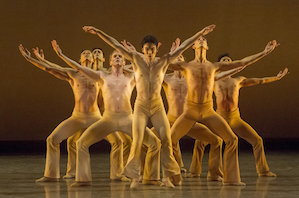
Photos by Robert Shomler
Neoclassical masters, the inspiration for Ballet San Jose’s performances this weekend at the Center for the Performing Arts, cover a lot of ground. So did this show, and generally speaking, the artists rose brightly to the challenge. Of the four works on the bill, two were by Sir Frederick Ashton, providing a wonderful glimpse of someone we don’t see in these parts all that often.
Les Rendezvous, which opened the evening, exemplifies Ashton Style: the demanding pointe work, lovely carriage of the arms, speed, energy, and precision, all delivered with charm and understatement. The meme borrowed from the British wartime slogan, Keep Calm and Carry On, is totally applicable here. Set to music by Daniel Francis Auber, orchestrated and arranged by Constant (the program calls him Constance) Lambert, for years a major force in the Royal Ballet, it embodies a sense of play.
At the gate of a garden, as six well-behaved ladies in white, with hats and gloves, greet each other in grand jetes, arabesques, and of course air kisses, shoulders passing close. The gents (their six partners) also execute grand jetes, albeit not quite as grandly. There are still dancers who don’t point their feet. Technique and the necessary elements of speed and timing remain problematic for some of the dancers in neoclassical pieces such as this one. But everyone’s enthusiasm, as well as a palpable sense of knowing how to take the stage, feels new and invigorating. Certainly Ballet San Jose has moved forward since the great upheaval and change in command that led to it becoming something of an ABT offshoot. The work has visibly paid off.

Amy Marie Briones and Maykel Solas, the principal couple, delighted together and separately. His split leaps were exceptionally high and clean, and her series of spins impeccable. The artful and artless pas de trois of Junna Ige and her partners Alex Kramer and Francisco Preciado were textbook Ashton, in the best way. No strain, just brilliant speed and timing, not to mention sunshine.
A guest artist, the young virtuoso violinist Rachel Lee, played for three of the four pieces (all but Les Rendezvous). She accompanied the Ballet San Jose Orchestra conducted by George Daugherty. They sounded marvelous throughout the show.
Ashton’s Meditation from Thais, a brief pas de deux set to music by Jules Massenet, beautifully displayed the plastique, power, and composure of Nutnaree Pipit-Suksun, in the arms of Jeremy Kovitch, who partnered her well. It’s poetic, tranquil, and tricky at the same time; he is required, at various seconds, to lift her straight up off a seated position on the floor; drape her around his neck, and lift her overhead so she can, extremely calmly (after all, this is Ashton), strike a still, meditative pose. They looked like they belonged together, in shades of muted yet festive gold and bronze, and Kovitch never let us see him sweat.
Stanton Welch’s Clear, to various excerpts from Johann Sebastian Bach, is the Australian’s Paul Taylor piece, without feeling in the least derivative. With open chests and expansive leaps, it surges powerfully onward in ensembles and solos, taking the breath away. That it doesn’t do the same to the dancers speaks volumes about how far the company has come. This really felt like a breakthrough number.

For male and female principal dancer (Akira Takahashi, a marvelous technician, and the graceful Jing Zhang respectively) and six more men, Clear is a festival of mutability at top speed, where giant leaps are dotted with lovely little moves — a rond de jambe en l’air here, a gargouillade there, or manly slaps on the bare tummy (pants by Michael Kors, abs by BSJ). One man even does an amazing series of perfect fouette pirouettes. The partnered interludes cool things down a bit, and the conclusion is so quiet, ending on an upbeat, that it’s easy to think the whole ballet was a dream. In a way, it was. Standout performances from all, but special huzzahs are owed to Francisco Preciado, Kendall Teague and James Kopecky for their pas de trois.
Clark Tippett’s Bruch Violin Concerto No. 1 could have been a train wreck and it still would have been terrific to hear Lee and her fiddle, but of course it wasn’t. The whole company shone with precision and musicality, looking proud to be there, as well they might. They conveyed a sense of tremendous unity in ensemble work, and the principal couples displayed warmth and brio.
Of the principals, Mirai Noda and Akira Takahashi, the couple in pink were particularly ebullient, with charming allusions to Spanish stylings, and Alexsandra Meijer, buoyantly partnered by Jeremy Kovitch, looked fresh and easy as the couple in blue.

